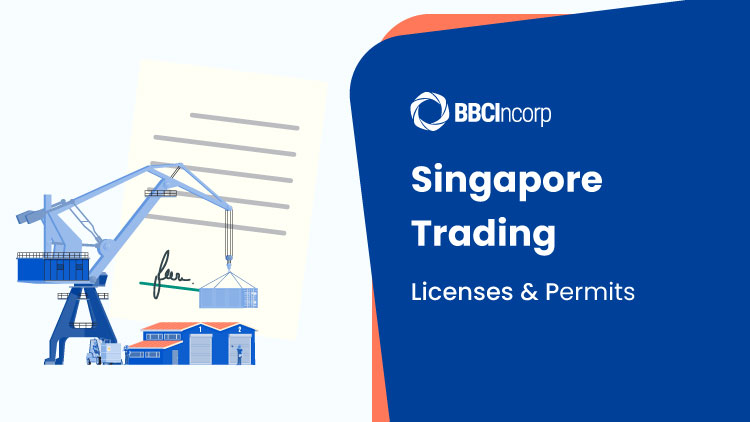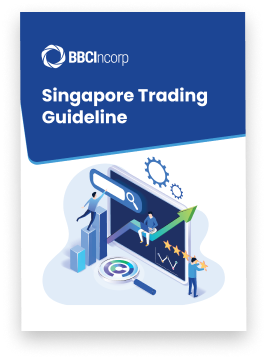
If you are looking to set up a trading company in Singapore, one of the first things you will need to do is apply for a trading license.
This document is required by law and outlines the specific activities that your company is allowed to conduct. In this article, we will provide an overview of trading licenses and permits in Singapore, as well as guide you through the process of obtaining one. Let’s get started!
Import-export licensing requirements
Importing goods into Singapore means having proper licenses and permits in place. Depending on the type of goods you are importing, you may need to apply for a license from the relevant government agency.
For example, if you are importing/ exporting food products, you will need to apply for a license from the Singapore Food Agency (SFA).
The process of applying for a trading license in Singapore can be done in a matter of days. You will first need to submit an application form to the relevant government agencies, along with supporting documents such as a business plan and financial statements.
Once the application has been approved, you will be issued a trading license, which must be renewed on an annual basis.
Controlled & prohibited goods
The Competent Authorities (CA) govern the influx of goods into Singapore, requiring importers to acquire proper authorization in the forms of advance notification and license/certificate approval.
If you’re not familiar with what category – controlled or prohibited – your goods are under, a brief search through the HS/CA Product Code Search Engine will reveal the Harmonized System (HS) or CA product code.
If you wish to trade in any of these controlled goods, you will need to obtain a license or permit from the relevant authority before doing so. The procedure for obtaining a license or permit and/or advance notification varies depending on the type of controlled good involved.
Singapore has a range of controlled and prohibited goods that are regulated by Singapore Customs in order to protect its citizens from potential harm. Some of the prohibited goods include firearms, ammunition, explosives, and other weaponry. The import, export, and movement of these items are also strictly regulated by Singapore Customs.
Strategic goods
The Strategic Goods (Control) Act requires anyone trading in strategic goods to have a valid license permit issued by the Ministry of Trade and Industry (MTI). These include arms and ammunition, military hardware, nuclear technology-related goods, dual-use goods, and so on.
Controlled drugs
The Misuse of Drugs Act requires any trading activities in controlled drugs to have a valid license issued by the Health Sciences Authority (HSA), including both prescription and non-prescription drugs.
For import of high-technology items
On top of applying for the Economic Development Board (EDB), high-tech importers will need to acquire the Import Certificate and Delivery Verification (ICDV) from Singapore Customs. This is due to the potential restriction imposed on the products in the countries from which they came.
As such, an ICDV is needed when the exporter of high-tech products initiates with a Singapore importer. If your high-tech products are covered under this, then they cannot be shipped anywhere else besides Singapore.
For export, transshipment, or transit of strategic goods
Under the Strategic Goods (Control) Act, a special Joint Declaration 3 permit – JNTDEC3 – is required for exporting, re-exporting, transshipping, and transporting goods that fall under the provision: Goods and technology manufactured to be used for military purposes.
Controlled & prohibited goods for export
The first step to trading internationally is understanding the regulations of the country you wish to export to. In Singapore, the majority of exporters have to obtain relevant exporting permits from the Customs Act and the Strategic Goods (Control) Act.
Controlled goods require an export permit issued by Singapore Customs before the goods can be exported. Prohibited goods cannot be exported from Singapore without a license or permission from the relevant authorities.
Strategic Goods (SG) refer to those items which could contribute to Singapore’s military capability. Therefore, Singapore carefully controls the transfer of these goods to safeguard national security interests and non-proliferation obligations.
Crucial tips for soon-to-be e-commerce business owners
Increasingly, businesses are turning to digital platforms to reach a wider audience through e-commerce. For this reason, you should investigate the factors essential to a successful online business in Singapore, a hotspot for industry professionals.
Penalties for non-compliance
If a trading company in Singapore does not comply with the licensing requirements, it may be liable for a fine of up to S$100,000 or imprisonment of up to two years, or both. Additionally, the company risks having its trading license revoked.
Non-compliance with the licensing requirements is a serious offense and trading companies should ensure that they are familiar with them before starting their business.
Import-export licensing application
There are a few steps that need to be completed to get a trading license in Singapore.
Step 1:
The first step is to submit an application form which can be obtained from the Accounting and Corporate Regulatory Authority (ACRA).
Step 2:
Once the form has been submitted, businesses will need to provide supporting documents such as their company’s business profile, details of the shareholders and directors, and other relevant information.
Step 3:
The next step is to attend an interview with ACRA, during which they will assess the applicant’s business plans and decide whether or not to grant a trading license.
Step 4:
If the application is successful, businesses will then need to obtain a permit from Singapore Customs and check if their goods are under any CA provisions before they can start trading.
Overall, the process of getting a trading license in Singapore is relatively straightforward and can be completed within a few weeks. Nevertheless, it is crucial to keep in mind that all the necessary steps must be strictly followed to avoid any delays or problems.

New guide
Unlock insights of Singapore's trading business!
Everything you need to know about starting an overseas trade business in Singapore.

Conclusion
We hope this guide has helped provide some understanding of trading licenses and permits in Singapore. If you’re interested in setting up a trading company in Singapore, get in touch with us today through our chatbox or send us an email via service@bbcincorp.com for further assistance.
BBCIncorp will be glad to help you navigate the process with a wide range of services designed to help businesses get started quickly and efficiently.
Disclaimer: While BBCIncorp strives to make the information on this website as timely and accurate as possible, the information itself is for reference purposes only. You should not substitute the information provided in this article for competent legal advice. Feel free to contact BBCIncorp’s customer services for advice on your specific cases.
Industry News & Insights
Get helpful tips and info from our newsletter!
Stay in the know and be empowered with our strategic how-tos, resources, and guidelines.





